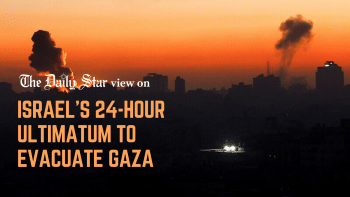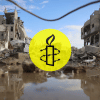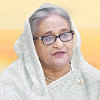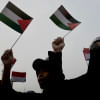How should we talk about Palestine, Hamas, and Israel?

Days since Hamas – the militant group ruling Gaza – launched the deadliest attack on Israel in 50 years, with the death toll mounting to over 1,300 civilians, Israel's government has demanded that millions of Palestinians leave their homes and has pummelled the blockaded territory with airstrikes, already killing at least 2,000 civilians. As videos of families scrambling in the rubble flood our screens, everyone around the world feels somewhat compelled to engage in talks about moral responsibility. But the moral contest unfolding in the media and on social media is getting messy, taking attention away from questioning the complex geopolitical stakes and the factors that perpetuate the vicious cycle of terrorism and settler violence.
There's many muffled sides to the raging debates. On one side, there's the hypocritical West, which has selectively condemned Hamas' attack on Israeli citizens, and made excuses for Israel's violent retaliation – one with "unprecedented might," as Netanyahu said – dropping 6,000 bombs in only six days in the 363 square km Gaza strip. To put things into perspective and understand the magnitude of depravity, during the air operations against ISIS from 2014 to 2019, the coalition led by the US averaged between 2,000 and 5,000 munitions each month across the entire regions of Syria and Iraq (both combined 626,494 square km). Israel's military operations have also been using dangerous white phosphorus bombs on one of the most densely populated areas in the world, where more than half the population is under the age of 18. As the unfathomable horrors ensue, the European Union and the US have affirmed Israel's right to defend itself, putting up Israeli flags and banning pro-Palestine rallies. The Western nations are unequivocally endorsing and aiding the mass murder of Palestinian citizens, which they have done since the inception of the conflict. Specifically, the US and its quest to ensure worldwide democracy falls short in its unwarranted political and military support for Israel's current far-right government championing militant Zionism. This consciousness of Western hypocrisy simply cannot be left out of the conversation.
Since the attack, there's also been a loud resurgence of the pro-Palestine left, who have been calling to contextualise the attack by Hamas. But this progressive movement calling for fair characterisation also has a fundamental flaw: taking it too far with self-defeating moral signalling. It has become almost fashionable at the moment to pounce upon anyone who condemns the killings of both Israelis and Palestinians, with a fierce herd mentality that conflates the act of criticising Hamas – which is, as we speak, holding innocent people hostage – to enabling Israel's apartheid. Of course, it's important to remind ourselves of the ongoing Nakba – the 75 years of oppression that Palestinians continue to face. And of course, Palestinian citizens are the victims here. But in a world where the powerful need little reason to distort that fact, we must be careful about how to productively raise the issue of the victim versus the perpetrator in the wake of the Hamas attack. And we must do so in a way that does not call for apathy towards the mass killing of innocent Jews. Some incidents in the "all out for Palestine" front have completely deviated from the fundamental principles of the liberation movement, abominably celebrating Hamas' attack as a "victory."
Just like anti-Soviet forces backed by the US after Moscow's invasion of Afghanistan mutated into the Al-Qaeda, which carried out the 9/11 attacks, Israel in fact helped create Hamas and its Muslim Brotherhood precursors to counter the Palestinian Liberation Organisation and the Fatah political party, led by Yasser Arafat (who himself referred to Hamas as a "creature of Israel"). Hamas, in other words, is the biggest blowback of Israel's historical neo-colonial policies.
One post being widely circulated reads: "Criticising Palestinian armed efforts while also criticising Israel is not a 'nuanced' stance, it's equalising the colonised with the coloniser." This position raises the much-required distinction between the colonised and coloniser, but it's strategically short-sighted in making its point. It can be interpreted as saying that decolonisation efforts in the Palestine liberation movement entails the killing of all innocent Israelis. The narrative can be twisted to fill anti-Semitic tropes and feed the Israeli far-right government's extremist actions. It is precisely this dialogue that has nurtured the bias of commentators in Western media, unproductively diverting the problem to being about progressives supporting the Palestinian liberation movement, rather than Israel's war crimes.
The movement for Palestinian liberation needs to address the creation of militant groups like Hamas – in the neo-colonial paradigm – which owe both their power and legitimacy to Israel in the first place. Just like anti-Soviet forces backed by the US after Moscow's invasion of Afghanistan mutated into the Al-Qaeda, which carried out the 9/11 attacks, Israel in fact helped create Hamas and its Muslim Brotherhood precursors to counter the Palestinian Liberation Organisation and the Fatah political party, led by Yasser Arafat (who himself referred to Hamas as a "creature of Israel"). Hamas, in other words, is the biggest blowback of Israel's historical neo-colonial policies.
Yitzhak Segev, who served as Israel's military governor in the 1980s, later told The New York Times that he financed the Palestinian Islamist Group with a budget. In 2009, Avner Cohen, a former Israeli religious affairs official, also told The Wall Street Journal that Israel had made a "mistake," and adopted a divide-and-rule strategy in Palestine, helping to build up a militant strain of Palestinian Islamists, in the form of Hamas, to fight left-wing Palestinian rivals for influence in Gaza and the West Bank. After the suicide bombings in 1994, when it became clear that Hamas wanted their own power in the region, Israel's military cracked down with force, which in turn increased the ordinary Palestinian's appeal to the militant group. The result of Israel's so-called "mistake" has led to the past two decades of violent power struggle. And the global dragnet, launched by the US against Islamist extremists since 9/11, has served to justify the current Israeli government's apartheid and its unprovoked attacks and unhinged killings of Palestinian civilians.
The analogies with the 9/11 attacks – which lie in the shock and unpreparedness of Israel's much-vaunted intelligence – are pertinent, as the consequences of Israel's war-mongering response create havoc in Gaza, with rigorous US backing. For better part of the last few decades, the US has invaded countries in the name of expunging terrorists, and made strategic blunders leading to unexplainable civilian casualties. And the lesson of Israel's invasion of Lebanon in 1982, with tacit US backing, must not be forgotten. The Lebanese Christian militia allied to Israel massacred Lebanese citizens and thousands of Palestinians in refugee camps. In response, Syria and Iran formed a collaborative resistance, which continues to shape the tense geopolitics of the region. Over the past four decades, if history has taught us anything, it's this: costly wars to wipe out militants perpetuate cycles of violence and lead to worse conundrums.
Hamas, which has been backed by Iran for decades, also attacked at a time when Israel and Saudi Arabia were cozying up with US backing, which was to slam the brakes on the China-brokered deal to launch rapprochement between Iran and Saudi Arabia. There are always complex politics underlining war crimes of such scale. It's never so black-and-white as the politicians present it to be. And, in that light, misinformation and social media noise largely detract the public from asking or examining the difficult, real questions.
Ramisa Rob is a journalist at The Daily Star.
Follow The Daily Star Opinion on Facebook for the latest opinions, commentaries and analyses by experts and professionals. To contribute your article or letter to The Daily Star Opinion, see our guidelines for submission.

 For all latest news, follow The Daily Star's Google News channel.
For all latest news, follow The Daily Star's Google News channel. 










Comments